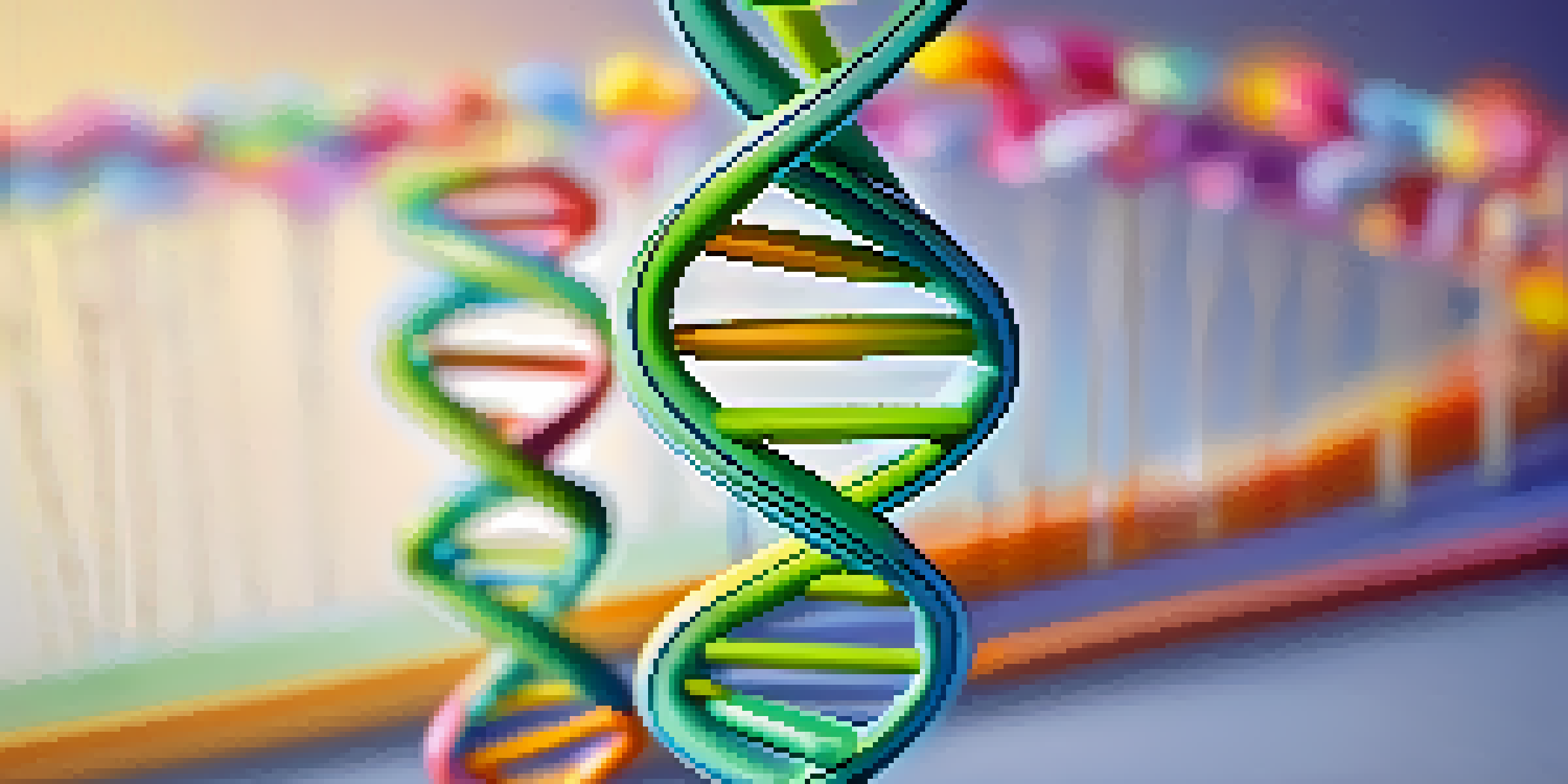Genomic Sequencing: Revolutionizing Diagnostics in Medicine

What is Genomic Sequencing and Why It Matters
Genomic sequencing is the process of determining the complete DNA sequence of an organism's genome. This powerful technology allows us to unlock the secrets held within our genetic material. Understanding these sequences is crucial because it can reveal how our genes influence health, disease, and even our response to medications.
Genomic sequencing is the key to understanding the complexities of human health and disease.
Imagine your DNA as a complex book, where each gene is a chapter that tells a unique story about your biological makeup. By reading this book, scientists can identify mutations or variations that may lead to health issues. This knowledge empowers healthcare providers to make informed decisions about prevention and treatment.
The importance of genomic sequencing has surged in recent years, especially with its increasing application in personalized medicine. Tailoring treatments based on an individual's genetic profile not only enhances effectiveness but also minimizes potential side effects, making it a game changer in the medical field.
The Impact of Genomic Sequencing on Diagnostics
Genomic sequencing is revolutionizing diagnostics by enabling earlier and more accurate detection of diseases. Traditional diagnostic methods often rely on symptoms or imaging, which can delay treatment. In contrast, genomic sequencing can identify conditions at a molecular level before symptoms even arise.

For instance, this technology has proven invaluable in oncology, where it helps detect specific genetic mutations that drive cancer. By pinpointing these mutations, doctors can select targeted therapies that are more likely to be effective for the patient, thus improving outcomes significantly.
Genomic Sequencing Unlocks Health Insights
This technology reveals how our genetic makeup influences health, disease, and treatment responses.
Moreover, genomic sequencing extends beyond cancer diagnostics. It plays a pivotal role in identifying rare genetic disorders, allowing families to make informed decisions about their health. This shift towards precision diagnostics marks a significant improvement in how we understand and treat various medical conditions.
Personalized Medicine: Tailoring Treatments to Individuals
One of the most exciting applications of genomic sequencing is personalized medicine. This approach customizes healthcare based on an individual's unique genetic makeup, ensuring that treatments are not one-size-fits-all. By analyzing a patient's genome, healthcare providers can select the most effective therapies with the least side effects.
The future of medicine is personalized, and genomic sequencing is at the forefront of this transformation.
For example, patients with certain genetic markers may respond better to specific cancer treatments. By utilizing genomic data, doctors can avoid prescribing medications that may not work or could cause harmful side effects. This tailored approach fosters a more patient-centric model of care.
The shift towards personalized medicine is empowering patients, giving them a sense of agency in their treatment plans. As genomic sequencing becomes more accessible, it paves the way for a future where healthcare is more responsive to individual needs, ultimately leading to better health outcomes.
Challenges and Ethical Considerations in Genomic Sequencing
Despite its promise, genomic sequencing comes with its own set of challenges and ethical considerations. One major concern is data privacy; the genetic information obtained is highly personal and sensitive. Ensuring that this data is protected from misuse is paramount in maintaining patient trust.
Another challenge is the potential for genetic discrimination. With the knowledge of an individual's genetic predisposition to certain diseases, there is a risk that this information could be used against them by employers or insurers. Striking a balance between advancing technology and safeguarding individual rights is crucial.
Personalized Medicine Enhances Care
Tailoring treatments based on an individual's genetic profile improves effectiveness and minimizes side effects.
Moreover, the interpretation of genomic data can be complex, and not all findings are straightforward. Misinterpretations can lead to unnecessary anxiety or inappropriate medical decisions. Therefore, ongoing education for both healthcare providers and patients is essential to navigate this evolving landscape responsibly.
The Role of Technology in Advancing Genomic Sequencing
Technology plays a vital role in the advancement of genomic sequencing. The development of high-throughput sequencing technologies has significantly reduced the time and cost associated with sequencing genomes. This rapid progress is making genomic testing more accessible to a broader population.
For instance, next-generation sequencing (NGS) allows for the simultaneous analysis of multiple genes, streamlining the diagnostic process. This efficiency not only accelerates diagnosis but also reduces the burden on healthcare systems, allowing for more patients to receive timely care.
As technology continues to evolve, we can expect even greater improvements in the accuracy and speed of genomic sequencing. Innovations such as artificial intelligence and machine learning are on the horizon, promising to enhance data analysis and interpretation, paving the way for more precise diagnostics.
Future Trends in Genomic Sequencing and Diagnostics
Looking ahead, the future of genomic sequencing in diagnostics is bright and full of potential. As research continues to advance, we can anticipate new developments that will further integrate genomic data into routine clinical practice. This integration will likely lead to a more comprehensive understanding of diseases and their underlying mechanisms.
One exciting trend is the rise of liquid biopsies, which utilize blood samples to detect genetic mutations without the need for invasive procedures. This non-invasive approach is set to transform cancer detection and monitoring, making it easier for patients and doctors to track treatment responses.
Ethical Concerns in Genetic Data
Data privacy and potential genetic discrimination pose significant challenges in the advancement of genomic sequencing.
Additionally, as public awareness of genomics grows, we may see a shift towards preventive medicine, where genomic sequencing is used to identify risks before they manifest as diseases. This proactive approach could lead to healthier populations and significantly lower healthcare costs in the long run.
Conclusion: Embracing the Genomic Revolution in Medicine
In conclusion, genomic sequencing is undeniably revolutionizing diagnostics in medicine, offering unprecedented insights into our health. By understanding our genetic makeup, we can make more informed decisions about prevention, treatment, and overall wellness. This technology is not just a trend; it represents a fundamental shift in how we approach healthcare.
As challenges in ethics, privacy, and data interpretation arise, it is crucial for the healthcare community to address these issues head-on. By fostering transparent conversations and building robust frameworks, we can harness the benefits of genomic sequencing while safeguarding individual rights.

Embracing this genomic revolution means a future where healthcare is more personalized, proactive, and effective. As we continue to unlock the mysteries of our DNA, we move closer to a world where every individual can achieve optimal health, tailored to their unique genetic profile.